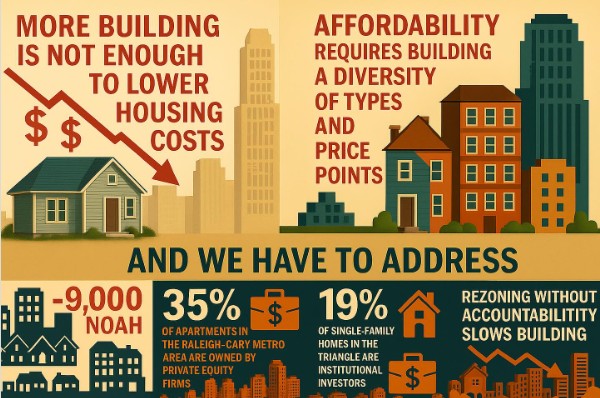
A Raleigh resident for 34 years and a proud homeowner in the historic Glenwood-Brooklyn neighborhood for 24, Roy Attride has been a dedicated neighborhood leader for many years. With a 22-year career in engineering including more than 7 years as a business leader before transitioning into the nonprofit sector in 2021, Roy Attride brings a balanced, solutions-driven perspective to community advocacy.
Passionate about fostering a successful, vibrant, and growing Raleigh, Roy advocates for thoughtful development that engages neighborhoods, supports smart transit and housing solutions, and ensures growth benefits all of Raleigh—not just a select few. Through Livable Raleigh, Roy shares insights, ideas, and advocacy for a Raleigh that thrives through collaboration, inclusivity, and sustainable progress.
We are reprinting this article from Raleigh Neighbors United. It relates to the 30-story Tower proposal at West Street (previously Z-54-22, now known as Z-12-25) and the proponents’ claims that it should be approved because any density anywhere leads to affordability which Mr. Attride debunks as follows:
Rezoning and adding more housing alone will not solve Raleigh’s affordability challenges.
Roy Attride (Raleigh Neighbors United)
In our opposition to Z-12-25 (30 stories 240ft from homes), many comments we have gotten and read over the last few months are around Raleigh housing being too expensive and that we need to rezone and build more to bring the prices down.
Raleigh Neighbors United could not agree more that Raleigh needs to attack housing affordability aggressively. However, while increasing housing supply is important, only focusing on volume can cause significant sustainability issues and
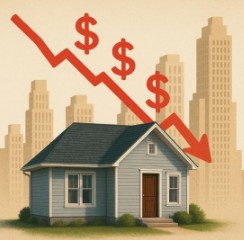
unintended consequences. Additionally, rezoning without incentives and accountability will not have the impact we need. To make meaningful progress rapidly, we need a comprehensive strategy that includes building a diversity of unit types and price points, expanding Naturally Occurring Affordable Housing (NOAH), balancing individual ownership and institutional investment, and incentivizing developers to ensure rezoned projects get built. Putting the weight of Raleigh’s affordability crisis or stalled development on a single rezoning request—especially one that conflicts with adopted plans and policies—does not make that request right, or good for Raleigh.
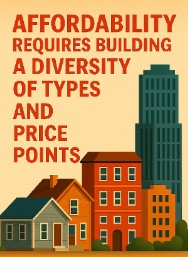
Housing costs are shaped significantly by what is being built. To effectively address affordability, we must ensure that new housing includes a diversity of unit types and price points, including both lower-cost ownership opportunities and affordable rental options. It’s not just how many units but the housing types that helps bring costs down. The Canada Mortgage and Housing Corporation (CMHC) highlights that constructing a mix of housing units at various price points, especially mid-priced options, can improve overall affordability (CMHC). Unfortunately, the vast majority of new construction and rezoning in and around Raleigh consists of higher price-points and luxury units. The lack of diversity in the types of units with the focus on high-priced units is driving housing costs up, not down. Policy reform is a
crucial aspect of the process. Raleigh needs to reevaluate zoning laws and building regulations to encourage diverse housing types that can lead to more affordable and inclusive communities (National Association of Home Builders). Successful models exist. Look at Columbus (Axios) and Montgomery County (Vox). These models illustrate that intentional planning and investment in diverse housing options can effectively address affordability challenges.
Another significant factor in increasing housing costs in Raleigh is the loss of Naturally Occurring Affordable Housing (NOAH). NOAH refers to residential properties that are affordable to low- and moderate-income households without the use of public subsidies or income-based restrictions. NOAH plays a crucial role in the affordable housing ecosystem. Since 2019, Raleigh has lost nearly 9,000 NOAH units (INDY Week) and replaced them with higher price-points and luxury units. Removing units from the lower end of the spectrum and replacing them with units at the upper
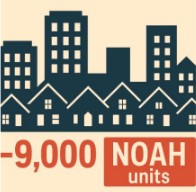
end continues to drive costs up. We need a strategy that includes preserving NOAH through acquisition funds, preservation incentives, partnerships with mission-driven developers, public-private partnerships, and revamped policy tools to help maintain affordable housing options and prevent displacement of low-and moderate-income residents. Again, successful models exist. Look at Minneapolis, MN – NOAH Preservation Fund, Brooklyn Park, MN – NOAH Preservation Program, Houston, TX – Tax Increment Reinvestment Zones (TIRZs). Without these steps, as we add more volume, housing prices will not come down enough.
Note from Livable Raleigh
A local case in point shows that “Trickle Down” affordability does not work in Raleigh. According to experts, housing “filters” to become affordable over the course of decades. In Raleigh when properties do become affordable through age, the properties are upzoned to be redeveloped into new market-rate housing. In the case we wrote about in November 2023, Raleigh could have had a win-win but in the end lost 56 units of affordable housing in one rezoning case.
Read the details here: Density does not create affordability
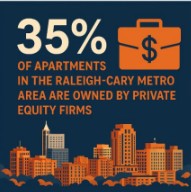
Institutional investors and private equity firms are also driving forces behind increasing housing costs in the triangle. 35% of apartments in the Raleigh-Cary metro area are owned by private equity firms, the highest percentage in the United States. (Axios). Additionally, institutional investors own or manage 19% of single-family homes in the Triangle area as of 2024 (TBJ). A large percentage of investor-focused ownership and management drives up housing costs as they look to maximize their own profitability. Joshua Coven’s 2025 Study found that institutional investors entering the single-family
rental market since 2012 have significantly influenced housing prices. In areas with high investor activity, these entities accounted for 23% of the observed price increases.
Private equity firms own about 20% of the apartment units in the Richmond metro area which has been associated with decreased affordability, rising rents, and increased eviction rates (Axios). For other reports and articles, see Government Accountability Office (GAO) Report, IE Business School Research. Investment in our area is good, and institutional investors can bring capital and efficiency to the housing market, but their profit-driven strategies can exacerbate affordability issues. Raleigh should consider measures such as regulating investor purchasing, promoting affordable housing, and enhancing transparency (AP News).
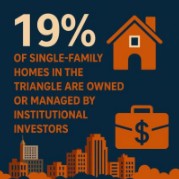
High concentrations of institutional investor owned properties tip the scale of a free market economy, making volume less of a lever due to economies of scale rather than market power.
The fact that many of the large rezonings that have been approved are not being built is also exacerbating the issue. In the last 5 years, 25 rezoning requests for 40 stories were approved. 12 have not broken ground, and the remainder did not build above 20 stories. Raleigh has limited space in the downtown core, and many key parcels are sitting vacant. As developers
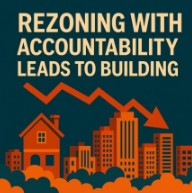
look to maximize profits, there is no incentive to motivate projects to break ground. Developers can wait indefinitely until they can maximize profitability, but the waiting has a significant cost to the city not only in high housing costs but the loss of important tax revenue. So, even increasing housing supply through rezoning is failing to deliver a respite. In the last 10 years in and around Raleigh, over 150,000 potential housing units have been rezoned, but they need to be built to alleviate issues. Rezoning on its own is not the answer. A study examining New York’s upzoning efforts between 2004 and 2013 found that while rezoning increased
the potential for housing development, the actual construction of new units was limited. The anticipated reduction in housing prices did not materialize, suggesting that upzoning alone is insufficient without accompanying measures to ensure development (PaperRepository+1SSRN+1). An Urban Institute study revealed that zoning reforms in Dallas led to a slight increase in housing supply but did not significantly affect housing affordability. In terms of inducements Los Angeles has Specific Plan Implementation where developers may be required to complete entitlements or begin construction within a set time, or face expiration of rezoning. Austin’s Planned Unit Development approvals can include sunset clauses that require substantial progress within a set number of years or face review and potential repeal. For Raleigh, without incentives or requirements to build, rezoning does not translate into more affordable housing prices.
Rezoning and adding more housing alone will not solve Raleigh’s affordability challenges. To make meaningful progress rapidly, we need a comprehensive strategy that includes building
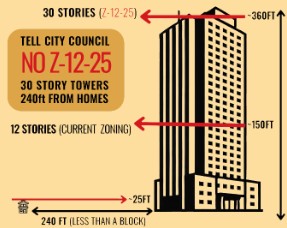
a diversity of unit types and price points, expanding Naturally Occurring Affordable Housing (NOAH), balancing individual ownership and institutional investment, and incentivizing developers to ensure rezoned projects get built. Putting the weight of Raleigh’s affordable housing issues and lack of development progress on a bad rezoning request that goes against plans and policies does not make the request right nor does it serve the city’s best interests. Say NO to 30 stories 240 feet from homes and let’s address the real issues.
Roy Attride, Raleigh Neighbors United
The neighbors support the current zoning which allows for 12 stories.
12 stories IS DENSITY
12 stories provides needed housing
Read more about the West St proposal here: Raleigh Neighbors United
NOTE from Livable Raleigh – Mayor Cowell says she is keeping track of her email on the issue of the proposed 30-story tower at West St. If you are opposed to it and want to see Raleigh honor the Comprehensive Plan as Mayor Cowell said we should, then please email the Mayor and ALL the City Council to express your concerns. This email address will send your message to all council members: citycouncilmembers@raleighnc.gov or you can find complete contact information for each councilor and their social media accounts here: City Council Contacts
West St Tower Violates Raleigh Downtown Plan
West St Tower Violates Equitable Transit Development
West St Tower Violates the Capital Blvd Corridor Study
West St Tower Proposal Violates the Comprehensive Plan
West St Tower Neighborhood Meeting – All Stand!
Want to know more about these signs?
If you appreciate the kind of reporting we bring to you
|
Please donate $10 or $20, Thanks for supporting |
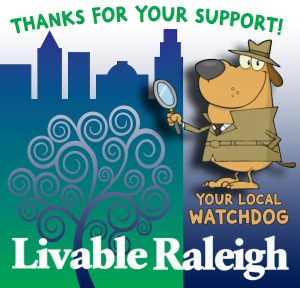 |

